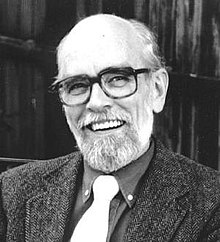Miller Williams: Difference between revisions
No edit summary |
|||
| Line 12: | Line 12: | ||
}} |
}} |
||
'''Stanley Miller Williams''' (April 8, 1930 |
'''Stanley Miller Williams''' (April 8, 1930{{spaced ndash}}January 1, 2015) was an American contemporary poet, as well as a translator and editor. He produced over 25 books and won several awards for his poetry. His accomplishments were chronicled in ''Arkansas Biography''. He is perhaps best known for reading a poem at [[Bill Clinton|President Clinton]]'s 1997 [[inauguration]]. One of his best-known poems is "The Shrinking Lonesome [[Sestina]]." |
||
==Early life== |
==Early life== |
||
Revision as of 14:51, 11 January 2015
This article includes a list of general references, but it lacks sufficient corresponding inline citations. (February 2013) |
Miller Williams | |
|---|---|
 | |
| Born | Stanley Miller Williams April 8, 1930 Hoxie, Arkansas, U.S. |
| Died | January 1, 2015 (aged 84) Fayetteville, Arkansas, U.S. |
| Occupation | Poet, translator, publisher |
| Nationality | United States |
Stanley Miller Williams (April 8, 1930 – January 1, 2015) was an American contemporary poet, as well as a translator and editor. He produced over 25 books and won several awards for his poetry. His accomplishments were chronicled in Arkansas Biography. He is perhaps best known for reading a poem at President Clinton's 1997 inauguration. One of his best-known poems is "The Shrinking Lonesome Sestina."
Early life
Williams was born in Hoxie, Arkansas, to Ernest Burdette and Ann Jeanette Miller Williams. He was educated in Arkansas, first enrolling at Hendrix College in Conway and eventually transferring to Arkansas State University in Jonesboro, where he published his first collection of poems, Et Cetera, while getting his bachelor's degree in biology. He went on to get a masters in zoology at the University of Arkansas in 1952.
Career
He taught in several universities in various capacities, first as a professor of biology and then of English literature, and in 1970 returned to the University of Arkansas as a member of the English Department and the creative writing program. In 1980 he helped found the University of Arkansas Press, where he served as director for nearly 20 years. He is currently a professor emeritus of literature at the University of Arkansas.
Poetry
Miller received the 1963–64 Amy Lowell Poetry Travelling Scholarship, and he won the 1991 Poets' Prize for his collection Living on the Surface.
In 1997, President Bill Clinton selected Williams to read his poem "Of History and Hope" at Clinton's second inauguration, instantly bringing Williams to national attention. In addition, President Clinton presented Williams with the National Arts Award for his lifelong contribution to the arts.
Personal life
Miller suffered from spina bifida.[1] He died on January 1, 2015. He had Alzheimer's disease.[2]
Williams lived in Fayetteville with his wife Jordan. Besides their daughter Lucinda Williams, a three-time Grammy Award winning country music, folk, and rock singer, named "America's best songwriter" by TIME magazine in 2002, they had a son, Robert, and another daughter, Karyn, who graduated from the School of Nursing at the University of Arkansas. Williams also had three grandchildren, and eight great-grandchildren.
Books
- A Circle of Stone, 1965
- So Long at the Fair, 1968
- Halfway from Hoxie, 1973
- Why God Permits Evil, 1977, Louisiana State University Press
- The Boys on Their Bony Mules, 1983, Louisiana State University Press
- Patterns of Poetry, 1986, Louisiana State University Press
- Living on the Surface, 1989
- Adjusting to the Light, 1992, University of Missouri Press
- Points of Departure, 1994
- The Ways We Touch: Poems, 1997, University of Illinois Press
- Some Jazz a While: Collected Poems, 1999, University of Illinois Press, ISBN 978-0-252-06774-7
- Making a Poem: Some Thoughts About Poetry and the People Who Write It, 2006, Louisiana State University Press, ISBN 978-0-8071-3132-9
- Time and the Tilting Earth: Poems, 2008, Louisiana State University Press, ISBN 978-0-8071-3353-8
References
Sources
- Farnsworth, Elizabeth. Jan. 16, 1996. Interview with Miller Williams. American Poetry/PBS Online Newshour. [1]
- Rosenthal, Harry. Jan 20, 1997. "Poet Addresses Inaugural Event." Washington Post. [2]
- "Miller Williams." 2003. Entry in Contemporary Authors Online. Gale.
- Gatewood, Willard B. October 28, 2009. "Miller Williams." Encyclopedia of Arkansas History and Culture
Further reading
- Burns, Michael (ed.) 1991. Miller Williams and the Poetry of the Particular. Columbia, Mo: University of Missouri Press.
- Correspondence and other materials. Miller Williams Collection, 1950–1995. Fayetteville, Ar: University of Arkansas Libraries, Special Collections Division, Manuscript Collection 1387. http://libinfo.uark.edu/specialcollections/findingaids/todd.html
- All articles with faulty authority control information
- 1930 births
- 2015 deaths
- American male poets
- Poets from Arkansas
- People from Lawrence County, Arkansas
- People with spina bifida
- Arkansas State University alumni
- University of Arkansas alumni
- University of Arkansas faculty
- Hendrix College alumni
- Rome Prize winners
- 20th-century American poets
- 21st-century American poets
- American translators
- 20th-century translators
- 21st-century translators
- Deaths from Alzheimer's disease
